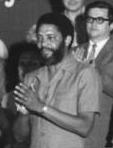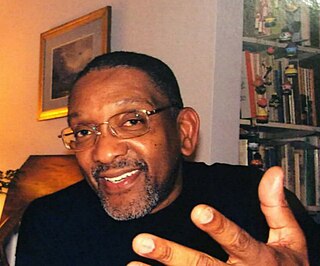Related Research Articles
The history of Grenada in the Caribbean, part of the Lesser Antilles group of islands, covers a period from the earliest human settlements to the establishment of the contemporary nationstate of Grenada.

The People's National Party (PNP) is a social-democratic political party in Jamaica, founded in 1938 by Norman Washington Manley who served as party president until his death in 1969. It holds 14 of the 63 seats in the House of Representatives, as 96 of the 227 local government divisions. The party is democratic socialist by constitution.

Sir Eric Matthew Gairy PC was the first Prime Minister of Grenada, serving from his country's independence in 1974 until his overthrow in a coup by Maurice Bishop in 1979. Gairy also served as head of government in pre-independence Grenada as Chief Minister from 1961 to 1962, and as Premier from 1967 to 1974.

Maurice Rupert Bishop was a Grenadian revolutionary and the leader of New Jewel Movement – a Marxist–Leninist party which sought to prioritise socio-economic development, education, and black liberation – that came to power during the 13 March 1979 revolution that removed Eric Gairy from office. Bishop headed the People's Revolutionary Government of Grenada from 1979 to 1983, when he was dismissed from his post and executed during the coup by Bernard Coard, leading to upheaval.
Antigua Caribbean Liberation Movement was a radical socialist and Pan-African political party in Antigua and Barbuda. ACLM was founded in 1968 by Tim Hector, the then chairman of the Progressive Labour Movement. The ideological inspiration for ACLM came from C.L.R. James.

Sir Paul Godwin Scoon was a Grenadian politician who served as Governor-General of Grenada from 1978 to 1992. His tenure is notable for its hectic events related to the rise and fall of the People's Revolutionary Government, as well as his personal involvement and support of the invasion of Grenada.

British African-Caribbean people are an ethnic group in the United Kingdom. They are British citizens whose ancestry originates from the Caribbean or they are nationals of the Caribbean who reside in the UK. There are some self-identified Afro-Caribbean people who are multi-racial. The most common and traditional use of the term African-Caribbean community is in reference to groups of residents continuing aspects of Caribbean culture, customs and traditions in the UK.

Socialist Party Scotland is the Scottish affiliate of the worldwide Marxist and Trotskyist organisation the Committee for a Workers' International. Socialist Party Scotland is the sister party of the Socialist Party in England and Wales. Socialist Party Scotland plays a leading role in the Trade Unionist and Socialist Coalition (TUSC), which stood ten candidates in Scotland at the 2015 general election and the 2016 Scottish Parliament election. Four of the ten Scottish TUSC candidates in 2015 were members of Socialist Party Scotland. TUSC did not stand candidates in the 2017 UK General Election or the 2019 UK General Election as it supported Jeremy Corbyn as leader of the UK Labour Party. TUSC stood in the 2017 council elections in Scotland alongside Dundee Against Cuts.

General elections were held in Grenada on 8 July 2008. Out of a total of fifteen seats, the opposition National Democratic Congress (NDC) won eleven seats and the governing New National Party (NNP) won four, bringing the NDC to power for the first time since 1995. The NNP was looking for a fourth consecutive term in power, which would have been a first in Grenadian history.
Indo-Grenadians or Grenadians who trace their roots to India, form the largest minority group in Grenada. This term is not generally recognized by Grenadians or indeed Caribbeans. They usually refer to themselves simply as Grenadian or possibly Caribbean. This group was first introduced during the second half of the 19th century when Grenada experimented with indentured labour. By the second half of the 20th century Indians were so integrated into Grenada’s society that a distinct Indian cultural identity was generally invisible. In addition, Indians were involved in every aspect of Grenadian life. Currently there are over 12,000 Grenadians of Indian and mixed-Indian descent.

Grenada is an island country in the West Indies in the Caribbean Sea at the southern end of the Grenadines island chain. Grenada consists of the island of Grenada itself, two smaller islands, Carriacou and Petite Martinique, and several small islands which lie to the north of the main island and are a part of the Grenadines. It is located northwest of Trinidad and Tobago, northeast of Venezuela and southwest of Saint Vincent and the Grenadines. Its size is 348.5 square kilometres (134.6 sq mi), and it had an estimated population of 124,523 in July 2021. Its capital is St. George's. Grenada is also known as the "Island of Spice" due to its production of nutmeg and mace crops.
Grenadians in the United Kingdom are citizens or residents of the United Kingdom whose ethnic origins lie fully or partially in Grenada. 9,783 Grenadian-born people were recorded by the 2001 UK Census.
Grenada-Soviet Union relations refers to the relations between Grenada, and the Soviet Union. Diplomatic relations between Grenada and the Soviet Union were severed in November 1983 by the Governor General of Grenada. Eventually in 2002, Grenada re-established diplomatic relations with the newly formed Russian Federation.

Merle Collins is a distinguished Grenadian poet and short story writer.
Richard Hart was a Jamaican historian, solicitor and politician. He was a founding member of the People's National Party (PNP) and one of the pioneers of Marxism in Jamaica. He played an important role in Jamaican politics in the years leading up to Independence in 1962. He subsequently was based in Guyana for two years, before relocating to London in 1965, working as a solicitor and co-founding the campaigning organisation Caribbean Labour Solidarity in 1974. He went on to serve as attorney-general in Grenada under the People's Revolutionary Government in 1983. He spent the latter years of his life in the UK, where he died in Bristol.
Norris Chrisleventon "Buzz" Johnson, generally known as Buzz Johnson, was a Tobago-born publisher and activist who in the 1970s relocated to England, UK. There he set up a small publishing company called Karia Press, based in east London, producing books relevant to community and race relations, and making available and better known the work of many key writers, including Claudia Jones, whom he is credited with having "rediscovered".
Patrick Philip Vernon is a British social commentator and political activist of Jamaican heritage, who works in the voluntary and public sector. He is a former Labour councillor in the London Borough of Hackney. His career has been involved with developing and managing health and social care services, including mental health, public health, regeneration and employment projects. Also a film maker and amateur cultural historian, he runs his own social enterprise promoting the history of diverse communities, as founder of Every Generation and the "100 Great Black Britons" campaign. He is also an expert on African and Caribbean genealogy in the UK. He was appointed a Clore Fellow in 2007, an Officer of the Order of the British Empire (OBE) in the 2012 Birthday Honours for "services to the Reduction of Health Inequalities for Ethnic Minorities", and in 2018 was awarded an honorary doctorate from the University of Wolverhampton.

Franklyn Harvey was a Grenadian academic, activist and professional, a founder of the New Jewel Movement (NJM) and principal author of their manifesto. He had a significant influence on the development of the Caribbean new left throughout the 1960s and 1970s and later, in the animation of hundreds of municipal and community projects all around the world. When the NJM took over the government of Grenada on 13 March 1979, Harvey's contributions to their manifesto began to take concrete form across the island.

William Arthur Watkin Strachan was a leading British communist, pioneer of black civil rights in Britain, human rights and anti-colonial activist, charity worker, newspaper editor, and British legal expert. He is most noted for his wartime achievements as a bomber pilot with the Royal Air Force (RAF) during the Second World War, and for his reputation as a highly influential figure within Britain's black communities.
Cleston Taylor (1926–2010) was a communist and Black civil rights activist, political prisoner, and trade unionist, who was most notable for his activities in Jamaica and the United Kingdom. Taylor was also a founding member of the British organisation Caribbean Labour Solidarity, and a member of the Communist Party of Great Britain. He held close personal connections with many leading Black British and Caribbean civil rights leaders such as Billy Strachan, Trevor Carter, Richard Hart, and Claudia Jones.
References
- ↑ Harry Goulbourne, Black Politics in Britain, Avebury, 1990, p. 105.
- 1 2 David Horsley, "Obituary: Cleston 'Chris' Taylor" Archived 24 December 2013 at the Wayback Machine , Morning Star , 7 April 2010.
- ↑ Inside back cover of Ken Fuller, The Struggle for Puerto Rican Independence and a Free Caribbean, a CLS pamphlet, 1980.
- 1 2 "About us". CLS.
- ↑ "Caribbean Labour Solidarity newsletter, 1983". USI (Understanding Slavery Initiative). Archived from the original on 26 June 2013. Retrieved 26 March 2013.
- ↑ Jeffrey, Lionel and Pansy (donated papers) at London Metropolitan Archives. AIM25.
- ↑ Jacqueline McKenzie and Ken Fuller, "Richard Hart: Caribbean Activist And Writer", Morning Star, 3 January 2014.
- ↑ Luke Daniels, "Richard Hart: A Tribute" Archived 27 May 2015 at the Wayback Machine , Pambazuka News, Issue 661, 16 January 2014.
- ↑ Winston James, calling Hart and Taylor "two very special and unsung heroes of the Jamaican working-class movement", dedicates to them his book A Fierce Hatred of Injustice: Claude McKay's Jamaica and His Poetry of Rebellion (Verso Books, 2000, pp. xv–xvi): "Dick and Cleston have never forsaken the Caribbean working class and, even in exile and old age, they have worked tirelessly and selflessly to promote its cause. Veterans of the Jamaican labor movement stretching back to the 1930s, in exile they founded together Caribbean Labour Solidarity in London some thirty years ago and, through thick and mainly thin, have remained steadfast in supporting the struggle of the poor and exploited in the Caribbean. Dick and Cleston deserve to be better known, appreciated and celebrated."
- ↑ Drayton, Harold A. (20 January 2014). "A personal tribute to my mentor, friend, and comrade Richard Hart (1917–2013), Part 2". Stabroek News.
- ↑ "Richard Hart (1917–2013)" Archived 3 April 2017 at the Wayback Machine , Caribbean Labour Solidarity.
- ↑ "CLS website". Archived from the original on 24 December 2013. Retrieved 26 March 2013.
- ↑ "Tivoli Gardens Massacre" Archived 23 September 2015 at the Wayback Machine , CLS.
- ↑ "Restore their Citizenship – No Apartheid in the Caribbean" Archived 26 May 2015 at the Wayback Machine , CLS.
- ↑ "CLS Windrush update". 18 March 2021. Retrieved 17 April 2021– via YouTube.
- ↑ "In Defence of UWI, its Vice Chancellor, and its Reparations Campaign – CLS Statement". Caribbean Labour Solidarity. Retrieved 17 April 2021.
- ↑ Richard Hart, "The Cuban way (Caribbean Labour Solidarity publication)" at Amazon.
- ↑ Robert Jackson Alexander, Eldon M. Parker, A History of Organized Labor in the English-Speaking West Indies, Westport, CT: Praeger, 2004, p. 448.
- ↑ WorldCat.
- ↑ Bibliographic information.
- ↑ Leon Cornwall, The Grenada "Elections": an analysis from behind prison bars, Caribbean Labour Solidarity with New Jewel Movement (UK) Support Group, 1984. WorldCat.
- ↑ Open Library.
- ↑ Steve Cushion and Dennis Bartholomew, "'By Our Own Hands' – A People’s History of the Grenadian Revolution", Socialist History Society, 22 January 2018.
- ↑ Everton Pryce, "In tribute to Richard Hart", Jamaica Observer , 12 January 2014.
- ↑ "Archives | Cutlass - Back issues" Archived 24 December 2013 at the Wayback Machine , Caribbean Labour Solidarity.